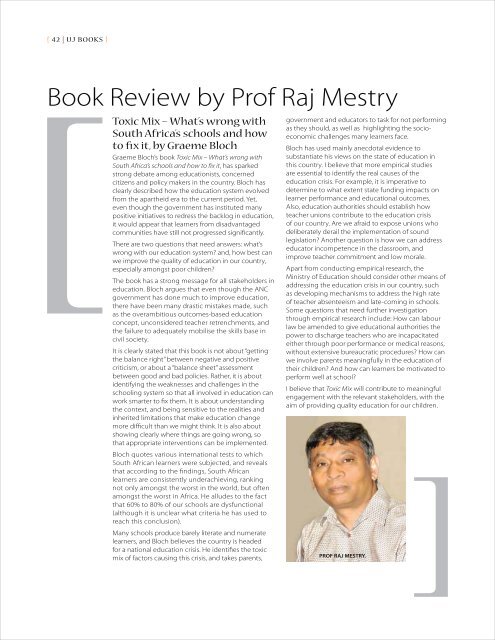November 2010 - University of Johannesburg
November 2010 - University of Johannesburg
November 2010 - University of Johannesburg
Create successful ePaper yourself
Turn your PDF publications into a flip-book with our unique Google optimized e-Paper software.
{ 42 | UJ BOOKS }Book Review by Pr<strong>of</strong> Raj MestryToxic Mix – What’s wrong withSouth Africa’s schools and howto fix it, by Graeme BlochGraeme Bloch’s book Toxic Mix – What’s wrong withSouth Africa’s schools and how to fix it, has sparkedstrong debate among educationists, concernedcitizens and policy makers in the country. Bloch hasclearly described how the education system evolvedfrom the apartheid era to the current period. Yet,even though the government has instituted manypositive initiatives to redress the backlog in education,it would appear that learners from disadvantagedcommunities have still not progressed significantly.There are two questions that need answers: what’swrong with our education system? and, how best canwe improve the quality <strong>of</strong> education in our country,especially amongst poor children?The book has a strong message for all stakeholders ineducation. Bloch argues that even though the ANCgovernment has done much to improve education,there have been many drastic mistakes made, suchas the overambitious outcomes-based educationconcept, unconsidered teacher retrenchments, andthe failure to adequately mobilise the skills base incivil society.It is clearly stated that this book is not about “gettingthe balance right” between negative and positivecriticism, or about a “balance sheet” assessmentbetween good and bad policies. Rather, it is aboutidentifying the weaknesses and challenges in theschooling system so that all involved in education canwork smarter to fix them. It is about understandingthe context, and being sensitive to the realities andinherited limitations that make education changemore difficult than we might think. It is also aboutshowing clearly where things are going wrong, sothat appropriate interventions can be implemented.Bloch quotes various international tests to whichSouth African learners were subjected, and revealsthat according to the findings, South Africanlearners are consistently underachieving, rankingnot only amongst the worst in the world, but <strong>of</strong>tenamongst the worst in Africa. He alludes to the factthat 60% to 80% <strong>of</strong> our schools are dysfunctional(although it is unclear what criteria he has used toreach this conclusion).Many schools produce barely literate and numeratelearners, and Bloch believes the country is headedfor a national education crisis. He identifies the toxicmix <strong>of</strong> factors causing this crisis, and takes parents,government and educators to task for not performingas they should, as well as highlighting the socioeconomicchallenges many learners face.Bloch has used mainly anecdotal evidence tosubstantiate his views on the state <strong>of</strong> education inthis country. I believe that more empirical studiesare essential to identify the real causes <strong>of</strong> theeducation crisis. For example, it is imperative todetermine to what extent state funding impacts onlearner performance and educational outcomes.Also, education authorities should establish howteacher unions contribute to the education crisis<strong>of</strong> our country. Are we afraid to expose unions whodeliberately derail the implementation <strong>of</strong> soundlegislation? Another question is how we can addresseducator incompetence in the classroom, andimprove teacher commitment and low morale.Apart from conducting empirical research, theMinistry <strong>of</strong> Education should consider other means <strong>of</strong>addressing the education crisis in our country, suchas developing mechanisms to address the high rate<strong>of</strong> teacher absenteeism and late-coming in schools.Some questions that need further investigationthrough empirical research include: How can labourlaw be amended to give educational authorities thepower to discharge teachers who are incapacitatedeither through poor performance or medical reasons,without extensive bureaucratic procedures? How canwe involve parents meaningfully in the education <strong>of</strong>their children? And how can learners be motivated toperform well at school?I believe that Toxic Mix will contribute to meaningfulengagement with the relevant stakeholders, with theaim <strong>of</strong> providing quality education for our children.PROF RAJ MESTRY.


